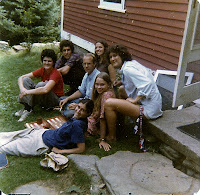Eleanor likes to keep order in the house. For this reason, soon after her daughter Lila arrived home from college, Eleanor suggested that her daughter clean out her closets and drawers to find clothes to sell to a local resale store. Eleanor had helped Lila unload the car and saw firsthand the clothing resources available to Lila.
 |
| Eleanor had helped Lila unload the car. |
Eleanor gathered a few items of her own, including, the red Albert Nipon dress she wore as she and Chauncey left their wedding reception. The dress was a gift from Eleanor’s stepmother, a Cuban professor with a flare for the dramatic. Eleanor and Lila both tried the dress on. It didn’t fit either one of them. They admired the dress for a few minutes. Lila made it dance on the hanger. Then, it went into the sell pile.
Lila’s boyfriend, Chive, was enlisted to help carry the clothes from the parking garage to the two resale stores. The first store claimed to buy only designer clothing. Eleanor felt confident about the Albert Nipon label.
The store owner was a petite blond in her fifties, dressed in tight, white pants and a colorful, flouncy top. She wore blue eye shadow. She educated Eleanor about clothing as she examined the offerings. Studying the Albert Nipon dress, she said, “Oh, yes, Albert Nipon. We sold a lot of him when we first opened in the early eighties. But, not now.” And, about a green silk shirtwaist dress from Brooks Brothers given to Eleanor by her father, the owner said, “No, no one comes in here asking to look more conservative.” Eleanor, Lila and Chive left without a penny. Chive commented that the owner had not looked at him once.
Eleanor remained optimistic and encouraged the others to continue on to store number two. A friendly, young Asian girl greeted them and asked to see what they had brought. Chive sat down on a bench nearby having lost interest in the whole process.
 |
| The dress was a gift from Eleanor's stepmother. |
The girl considered each article of clothing carefully. She held the item up to the light, felt the material and, more often than not, folded it up and placed it in the “NO” pile. When she got to the Albert Nipon dress, she took more time than usual. She held it up several times. She turned her head and looked around the store as though she wanted to consult with the store owner about the dress. Eleanor was excited.
No one else came to check out the dress. The girl selected six items, including the dress, out of about 40. She priced each article and offered Eleanor 35% of the total in cash or 50% of the total for store credit. A pair of short overalls Lila had purchased for $6.99 were priced at $9.50. The Albert Nipon dress, originally $200, was priced at $10.50. Eleanor handed Lila a certificate for store credit worth $34.50. Lila and Chive were dismayed. Eleanor was not. She felt relieved to be able to cross off selling used clothing as a career option and return to her drawing.

















































